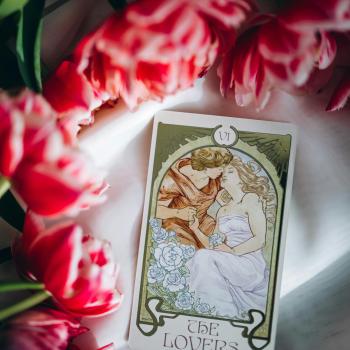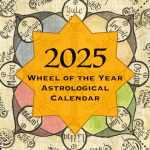
Mysticism is an important experiential practice for many people. In several Pagan traditions we believe that we can communicate directly with the Divine. We have different beliefs about the nature and origin of these Powers, and the information we receive varies. Heathen völva breathe the fumes of wormwood and mugwort and speak the words of Wyrd. Druid ovates sink into trances and speak the guidance of the ancient gods. Many Greek pantheists incubate dreams or seek the wisdom of Apollo. Shamanic traditions both ancient and modern use drumming, dancing and entheogens to travel the spirit realm and bring out its insights or heal the body and spirit. And modern Witches and Wiccan/ates draw down the moon and the sun so that we can talk directly to our deities. There is a firmly divided camp between the skeptics and the believers. What is this phenomenon? Where does it come from? How much does it have in common with the mystical experiences of St. John of the Cross and Hildegard of Bingen, Mohammed, or even the trance channeling of Jane Roberts?
A Question of Theology
Literal Gods
Some Pagans believe that we are communicating directly with actual, tangible deities. To them, these beings are as real as you or I, with clearly-defined roles, powers, and personalities. In their belief, drawing down Hecate and serving as a cheval for Erzuli means that they are speaking and interacting directly with a personality that is independent and separate from us. These Pagans choose to serve individual gods or goddesses directly. They have consciously chosen to aspire to Valhalla or be remembered in Hades. To accept this belief accepts the literal existence of other deities and beings as well. Perhaps St. John really was talking to Jehovah and Joan of Arc really did hear the voices of angels; or perhaps not, as many Pagans who hold this view seem to believe that any religion that holds to some sort of “Overgod” who is greater than all other gods is false, but all the different cultural pantheons are true and real.
The Pagans who believe in literal gods can be strangely inconsistent when it comes to New Age matters. Some believe in the existence of the entity “Seth” or “Abraham” and the ghosts of their ancestors; some don’t, and those who don’t tend to be divided as to whether or not malicious entities who claim to be these beings are deluding us, or whether those who channel them are crazy or outright charlatans. Often for these Pagans, there is a literal Truth. For example, there is only one proper way to worship Hecate, and portraying Her differently in ritual or an image is “wrong.”
Egregors
Some Pagans believe that we are speaking with egregors. An egregor is a thought-form, given a semblance of life and identity by the power of belief. Herne exists because we believe He does, and He has certain powers and qualities because we believe that He does. In this way, we create the gods as much as They create us.
By extension, we may also create elementals to do our will. Angels and demons also exist because we believe they do, and so to many (but not all!) who hold this belief, they can only affect us if we believe they can. Thus, the Christian God exists because so many people believe in Him. This is why it’s so hard to affect the Christian status quo with magick.
Those who believe this often trust that to the channelers, “Seth” and “Abraham” are quite real; but they might question the existence of ghosts and ancestor-spirits, believing them to be the constructs of memory rather than the actual spirits of the departed.
Archetypes
Some Pagans take a view that is colored by modern Jungian psychology, and they believe that the deities are archetypes. That is, gods are symbolic constructs that ultimately come from the human psyche, drawn from either the universal human experience or from a particular cultural experience. The deities, then, are names and personifications given to these symbols so that people can interact with Them on a human level. Aphrodite, for example, becomes a personification of Love, Sex and Relationships; Kali becomes a personification of the powers of Creation and Destruction. From the point of view of these Pagans, channeled New Age entities are either silly or a sign of schizophrenia, and ghosts are wistful thinking.
Manifestations of the Psyche
Some Pagans believe that the gods are merely aspects of ourselves. In the same way that archetypes are personifications of ideas and themes, we give personalities to internal feelings and thoughts, so that we can interact with them in a construct. They differ from those who belief in archetypes in that archetypes might be manifestations of a shared human consciousness; while these Pagans believe that the gods are entirely created in our own individual imaginations. Therefore, if we want to believe in SpongeBob Squarepants, for us, SpongeBob Squarepants becomes a useful internal construct that delivers messages we need from our own subconscious minds. Channeled entities, then, have just as much “reality” as any other manifestation of the psyche, and ghosts are constructs we use to remember our loved ones and come to terms with our grief.
Yes, And
As I wrote about in a previous column, one of the beautiful things about Paganism is that we don’t have to choose. Contradictory truths can be equally true. Most of the Pagans I know hold combinations of these beliefs; though I have rarely seen the literalists and the psychology advocates intersect. If you haven’t done so before, you might want to consider these differing points of view and decide for yourself where it is that you fall. For instance, I believe in egregors, formed from our collective archetypical consciousness, which then have real manifestations who can interact with us and each other. We create the gods, so that They can create us. They are beyond the limits of space and time because we believe that They are, and so They can do what we cannot – and They really can do it! But just because this is what I believe, doesn’t mean that it is more or less valid than any other belief; it just works for me.
Implications of Faith
What you believe about the nature of the gods has a direct bearing on your interaction with Them. How seriously do you take Them? When someone claims to be interacting with the Divine, through a vision, through intuitive insight or through possession-trance, when do you believe Them, and when do you doubt? If you had a dream that Cerridwen came to you and warned you not to go to work the next day, how likely are you to stay home? If a Voodoo Mambo is being ridden by Erzuli and Erzuli tells you that She wants you to quit your job and become a witch doctor, how likely are you to accept that as a vocation? Have you ever seen what you believe to be a god who looked as solid and real as you or I? (I have!) How do you react?
Using Our Discernment
The Gods Have Ulterior Motives
Above all, I think it important to keep in mind a few things about the gods, regardless of your belief in Their natures and origins.
Let’s say that the gods really are literal beings who actually exist. Let’s say that They choose us specifically for holy tasks. Why have you, specifically, been chosen? Is it because you are special and wonderful and unique? (Of course you are, just like everyone else!) Or is it because They, having personalities as we do, have realized that you and They share a common interest?
I have felt this kind of hand on my life only a few times. One is what led me to take my name – I am a daughter of Diana, Queen of the Witches, Who answered my prayer when I was a little girl and gave me a goddess to believe in and who aided my magick and my self-empowerment. In return She asked me to teach Witchcraft to the masses and liberate the oppressed. I am glad to do this. I share Her goals. And I think She knew it when She first came to me as I prayed to the moon at the age of ten; though of course, I didn’t know it at the time.
Some people call that “synchronicity,” or “guidance from your Higher Self.” They say that things fall into place when you follow it. But understand it for what it is. The gods, like us, probably have ulterior motives. Sometimes, They have a sense of humor. They want us to do these things because it’s something They are interested in. They might be willing to sacrifice you to the Greater Good. Remember, one of Odin’s epithets is “betrayer of warriors” because if you are a great warrior, He is likely to take you for Valhalla when you least expect it. By all means if you believe in a cause and wish to make that choice because you believe it is good, do so! But go into it with your eyes open. Blind faith and self-sacrifice is usually a Christian ethic. You should be getting something out of the relationship too, be it empowerment, love, or comfort.
The Gods Have No Bodies
Another thing to keep in mind, especially when you ask the gods for help, especially in magick, is that real or not, the gods are not physical. They do not have bodies. Generally, that means They do not understand that you have to eat, you have to have a roof over your head, and you have limited time in which to accomplish things because you are mortal. They do not understand these limitations, and unless you have developed a co-creative relationship with Them, you may find it difficult to negotiate. Because I know that They don’t understand, I think it’s perfectly okay to tell Them “No!” if They ask you to do something you’re just not capable of. And I think it’s okay to ask Them to hurry things along as well if the need is great. It’s not sacrilegious to parley.
The Gods Have to Use Your Language to Be Understood
I once read a book that was highly recommended to me by a friend of mine in the New Age movement. The author had channeled Gaia and was writing what she had channeled. I picked it up with interest. Gaia is a goddess (well, titan, actually) that I know; I’ve worked with Her before. Much of it was exactly what we, as Pagans, would believe were the words of Gaia. But then there was a whole section about Atlantis, and the Mayan calendar, and a lot of other things I associate with the New Age that I don’t personally take seriously.
How should we regard these sorts of situations? Most Pagans I know would immediately dismiss the whole book as garbage and the author as a nut or a liar. But I don’t think so.
See, our gods are not physical. They are beyond space and time. They are also beyond language. If They are speaking through somebody in a divine communion, a drawing down or a possession trance, They have to use the hardware and the software provided. In other words, whether you believe the gods come from without or within, all such words spoken by the gods must go through a mortal filter first.
A good trance channel, shaman, witch or cheval does his or her best to be a good conduit. We try to make our bodies and our minds into fiber-optic cables, carrying the messages of Divinity as clearly and as undistorted as possible. But the fact is that there is always resistance to the signal. There’s always our own dross to deal with. So the moment a word is spoken, even if the Morrigan Herself is animating the mouth, the message is corrupted. It’s like trying to interpret an omen. We do the best we can, but inevitably, even the best-intentioned message suffers in the translation. Often, our own agendas and feelings confuse the issue.
If you are the one drawing down, don’t make the mistake of confusing yourself with the Goddess. You are a phone line or a DSL cable, not the chosen avatar of Inanna. You are merely the messenger. Do your best to get out of your own way and let divine words come through you, uncensored and unedited. Try not to let fear, ego, judgment or pride distort the signal, but understand that no matter what, it always will. Be as open to different interpretations as anyone else.
When your High Priestess draws down the moon, listen with love and respect to the Goddess, but use your own discernment in your understanding of the message. However, don’t discount everything she says just because some of it doesn’t ring true to you. Like everything in Paganism, take from it what is of value to you, even if you don’t like it. Even a complete jerk or a complete moron can be divinely inspired. Don’t discount the message just because you don’t like or don’t respect the person.
I heard a joke (or perhaps a parable) once that the Goddess decided that it was time to bring Her wisdom back into the world. She looked all over for women to be Her prophets – and realized that the world was so poisoned with patriarchy and male privilege that appointing women to the task would be impossible. So She chose men, but because She resented having to do so, She chose the weirdest, most arrogant men She could find. Well, we all know the founders of modern Wicca were hardly exemplary in their behavior, but the result was the resurgence of Paganism.
Next column: The Doers and the Don’ters
Seekers and Guides is published on alternate Mondays. Follow it via RSS or e-mail!

















